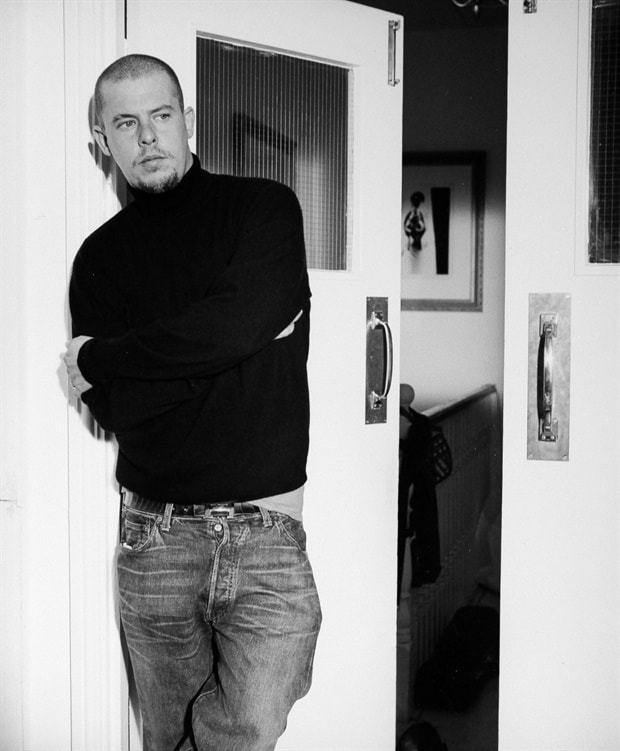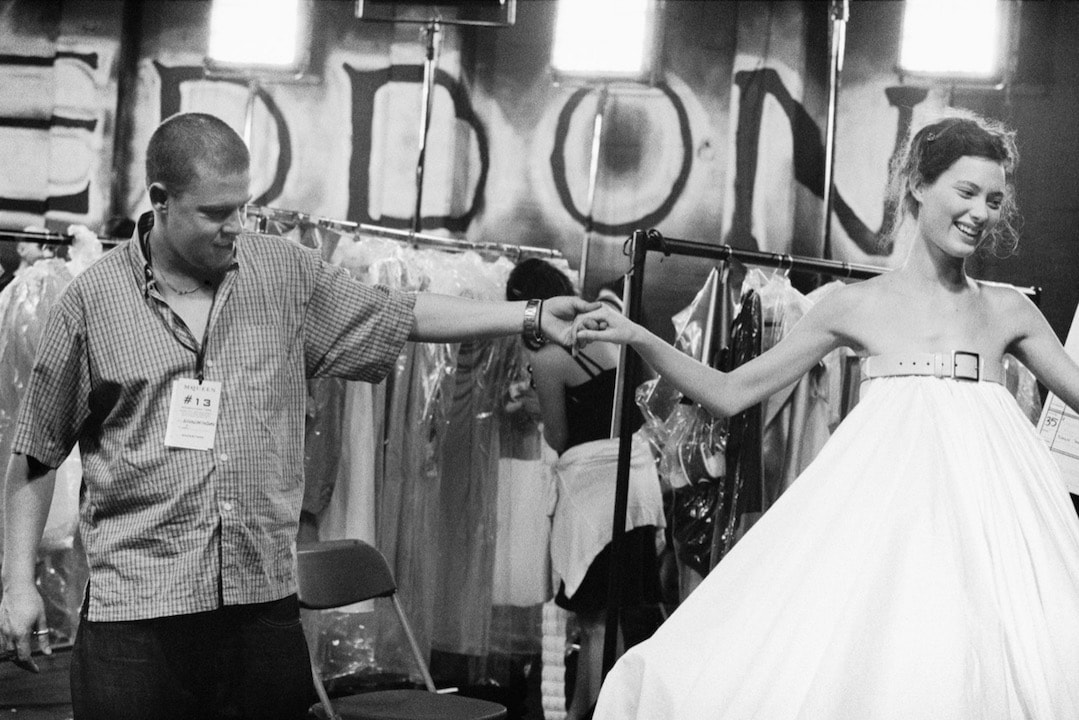
Reviewed by David Noh / Film Journal International
The last century, filled with irrevocable world change resulting from technology's innovations and the tragedy of war and other disasters of unprecedented dimension, was also filled with an elite, highly variegated cadre of fashion designers whose work both reflected and sometimes even instigated such change. Poiret, Chanel, Schiaparelli, Balenciaga, Dior, Courrèges, Saint Laurent, Lagerfeld, Miyake, Kawakubo, Westwood and Galliano all deserve a place in this sartorial Valhalla, but none of them was more gifted or—sadly—more tragic than the last of this illustrious line, Alexander McQueen.
Born one of six kids to a London cab driver, this Cockney lad shot to fashion stardom, changing how we look at and wear clothes, from the highest-end couture to just everyday knocking-about duds, before succumbing to severe depression and killing himself at age 40 in 2010.
McQueen, the exhilarating, heartbreaking documentary by Ian Bonhôte and Peter Ettedgui, presents an almost excruciatingly intimate portrait of this genius. Rather than go the glib starfucker route of rounding up the usual celebrity suspects—Madonna, Gaga, David Bowie, Sarah Jessica Parker—to spout bon mots about red-carpet moments, the filmmakers have made the true stars of their film the myriad close friends and co-workers who really knew the good, the bad and the ugly of this complex, tortured genius on a daily basis.
The rewarding result is that you get a true idea of what it was like to be in the workroom, thrillingly creating the magic of this master, or, adversely, stuck at a posh intimate soirée as the very same guy you’d do anything for eviscerates you because of some perceived failing on your part. Lee, for such was McQueen’s actual given “less posh” name, could be both extraordinarily sophisticated and an obscenity-spewing, shit-stirring hooligan. An early penchant for fashion led to a total mastery of needle, thread and scissors, honed by a Savile Row apprenticeship and a graduation collection at Central St. Martin’s school that was snapped up in its entirety by influential fashion editor Isabella Blow, who saw that the right connections were made. At the time of his death, McQueen had designed for the prestigious house of Givenchy, had his own lines carried in boutiques around the world, won every fashion award there was to be had and was made a Commander of the British Empire by the Queen.
But, as one friend observes, “The more money he made, the more unhappy he was.” The roots of this misery lay in childhood abuse, revealed here for the first time by his family, personal insecurities exacerbated by severe drug and alcohol addiction, and the business of fashion itself, which has traditionally been known to eat its young through the unbearable pressure and highly questionable values that can make it such a beautiful yet toxic poison.
McQueen’s sister Janet and longtime pals Mira Chai Hyde and Sebastian Pons are especially eloquent and moving with their recall of his kaleidoscopic life and devastatingly sad end, alone and by hanging. The recent deaths of his adored mother and Blow (a suicide after having fallen from McQueen’s favor) had utterly shattered him. Blow’s widower, Detmar, provides a lot of heart as well as a welcome Wilde-ian élan that lightens this darkest of passages.
The film’s one shortcoming is the short shrift it gives to McQueen’s actual fabulously original and highly wearable creations. Only his notorious, butt cleavage-revealing “bumster” trousers are featured in any depth, as the directors’ priorities are clearly with the human rather than sartorial angle. The McQueen show “Savage Beauty” at New York’s Metropolitan Museum of Art broke all attendance records, and if you saw it, that will stand you in good stead here. If you missed it, by all means Google it if only to see what timeless, soul-stirring and magnificently wrought beauty can emerge from even the most damaged, death-obsessed soul.
The last century, filled with irrevocable world change resulting from technology's innovations and the tragedy of war and other disasters of unprecedented dimension, was also filled with an elite, highly variegated cadre of fashion designers whose work both reflected and sometimes even instigated such change. Poiret, Chanel, Schiaparelli, Balenciaga, Dior, Courrèges, Saint Laurent, Lagerfeld, Miyake, Kawakubo, Westwood and Galliano all deserve a place in this sartorial Valhalla, but none of them was more gifted or—sadly—more tragic than the last of this illustrious line, Alexander McQueen.
Born one of six kids to a London cab driver, this Cockney lad shot to fashion stardom, changing how we look at and wear clothes, from the highest-end couture to just everyday knocking-about duds, before succumbing to severe depression and killing himself at age 40 in 2010.
McQueen, the exhilarating, heartbreaking documentary by Ian Bonhôte and Peter Ettedgui, presents an almost excruciatingly intimate portrait of this genius. Rather than go the glib starfucker route of rounding up the usual celebrity suspects—Madonna, Gaga, David Bowie, Sarah Jessica Parker—to spout bon mots about red-carpet moments, the filmmakers have made the true stars of their film the myriad close friends and co-workers who really knew the good, the bad and the ugly of this complex, tortured genius on a daily basis.
The rewarding result is that you get a true idea of what it was like to be in the workroom, thrillingly creating the magic of this master, or, adversely, stuck at a posh intimate soirée as the very same guy you’d do anything for eviscerates you because of some perceived failing on your part. Lee, for such was McQueen’s actual given “less posh” name, could be both extraordinarily sophisticated and an obscenity-spewing, shit-stirring hooligan. An early penchant for fashion led to a total mastery of needle, thread and scissors, honed by a Savile Row apprenticeship and a graduation collection at Central St. Martin’s school that was snapped up in its entirety by influential fashion editor Isabella Blow, who saw that the right connections were made. At the time of his death, McQueen had designed for the prestigious house of Givenchy, had his own lines carried in boutiques around the world, won every fashion award there was to be had and was made a Commander of the British Empire by the Queen.
But, as one friend observes, “The more money he made, the more unhappy he was.” The roots of this misery lay in childhood abuse, revealed here for the first time by his family, personal insecurities exacerbated by severe drug and alcohol addiction, and the business of fashion itself, which has traditionally been known to eat its young through the unbearable pressure and highly questionable values that can make it such a beautiful yet toxic poison.
McQueen’s sister Janet and longtime pals Mira Chai Hyde and Sebastian Pons are especially eloquent and moving with their recall of his kaleidoscopic life and devastatingly sad end, alone and by hanging. The recent deaths of his adored mother and Blow (a suicide after having fallen from McQueen’s favor) had utterly shattered him. Blow’s widower, Detmar, provides a lot of heart as well as a welcome Wilde-ian élan that lightens this darkest of passages.
The film’s one shortcoming is the short shrift it gives to McQueen’s actual fabulously original and highly wearable creations. Only his notorious, butt cleavage-revealing “bumster” trousers are featured in any depth, as the directors’ priorities are clearly with the human rather than sartorial angle. The McQueen show “Savage Beauty” at New York’s Metropolitan Museum of Art broke all attendance records, and if you saw it, that will stand you in good stead here. If you missed it, by all means Google it if only to see what timeless, soul-stirring and magnificently wrought beauty can emerge from even the most damaged, death-obsessed soul.
DISCUSSION FOLLOWS EVERY FILM!
$6.00 Members / $10.00 Non-Members
TIVOLI THEATRE
5021 Highland Avenue I Downers Grove, IL
630-968-0219 I www.classiccinemas.com
We apologize—Movie Pass cannot be used for AHFS programs.
$6.00 Members / $10.00 Non-Members
TIVOLI THEATRE
5021 Highland Avenue I Downers Grove, IL
630-968-0219 I www.classiccinemas.com
We apologize—Movie Pass cannot be used for AHFS programs.








